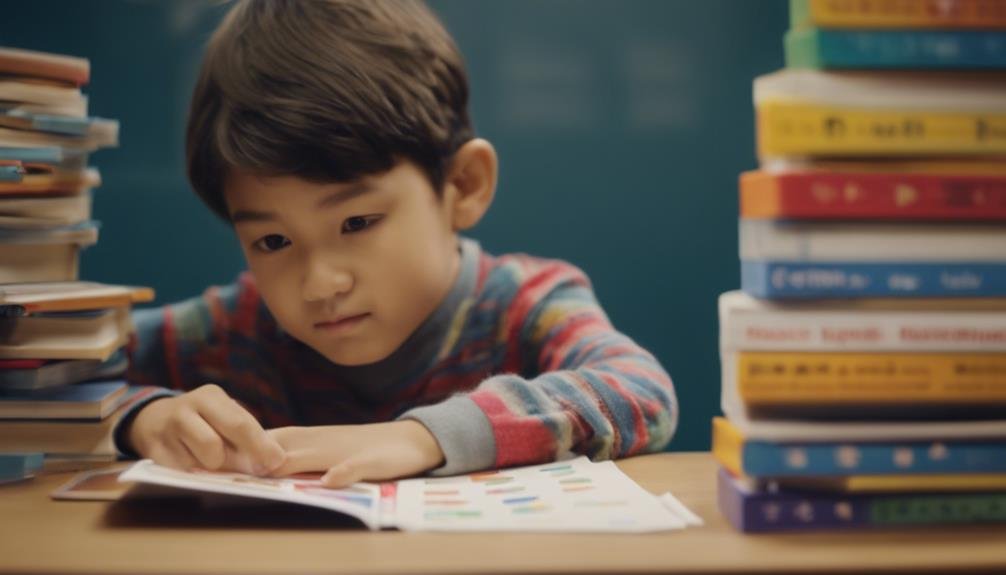"Cherishing Little Steps - A Haven for Baby and Family Journeys"
The Benefits of Bilingual Education in Early Childhood
Imagine a child effortlessly switching between languages, seamlessly maneuvering cultural nuances with ease. This skill not only opens doors to various opportunities but also enhances cognitive abilities in ways you might not expect.
The advantages of bilingual education in early childhood are vast and impactful, touching on aspects beyond just language acquisition. As you explore the benefits further, you'll uncover a plethora of advantages that go well beyond the surface level.
Key Takeaways
- Bilingual education enhances critical thinking skills and language acquisition in young learners.
- Bilingual children outperform monolingual peers in academic performance.
- Bilingualism fosters cultural understanding and communication abilities.
- Early bilingual education lays a strong foundation for cognitive benefits and global success.
Cognitive Development Enhancement

Enhancing cognitive development through bilingual education in early childhood has been supported by numerous studies showcasing improved critical thinking skills and language acquisition abilities in young learners. Research indicates that bilingual children often demonstrate advanced critical thinking capabilities compared to monolingual peers. This is attributed to their increased cognitive flexibility, as they're accustomed to maneuvering between two languages, which stimulates their problem-solving skills and enhances their ability to think abstractly.
Studies have shown that bilingualism can have a positive impact on various cognitive functions, such as attention control, cognitive processing speed, and working memory. The constant need to switch between languages exercises the brain, leading to improved executive function and cognitive skills. Additionally, bilingual children tend to exhibit better metalinguistic awareness, which is important for developing critical thinking skills.
Improved Problem-Solving Skills
Studies have consistently shown that bilingual education in early childhood leads to improved problem-solving skills in young learners. By engaging with two languages from a young age, children develop enhanced critical thinking abilities and a knack for finding creative solutions to challenges. This cognitive advantage stems from the constant need to switch between languages, which requires mental flexibility and problem-solving skills. Research indicates that bilingual children often outperform their monolingual peers in tasks that involve problem-solving and decision-making.
| Benefits of Bilingual Education in Early Childhood |
|---|
| Improved Problem-Solving Skills |
| Enhanced Critical Thinking |
| Creative Solutions Development |
This table highlights the key aspects of how bilingualism contributes to better problem-solving skills. The ability to think critically and come up with creative solutions is essential in navigating the complexities of today's world. Bilingual education sets the stage for young learners to excel in these areas, providing them with a strong foundation for future academic and professional success.
Academic Performance Boost

Moreover, bilingual education in early childhood significantly enhances academic performance, offering young learners a strong foundation for success in their educational pursuits. Research has demonstrated that children who receive bilingual education not only develop higher levels of language proficiency in both their native and second languages but also gain a significant educational advantage compared to their monolingual peers.
Studies indicate that bilingual students tend to outperform monolingual students in various academic areas, including reading, math, and problem-solving. This advantage can be attributed to the cognitive benefits of bilingualism, such as enhanced executive function skills, improved attention control, and better memory retention. These cognitive advantages directly translate into improved academic performance across different subjects and contribute to overall academic success.
Moreover, bilingual education promotes a deeper understanding of complex concepts and nurtures critical thinking skills. By engaging with content in multiple languages, students develop a more nuanced perspective, enabling them to approach academic challenges from different angles. This comprehensive approach to learning not only enhances academic performance but also equips young learners with the skills necessary for future academic endeavors.
Cultural Understanding Promotion
To further understand the impact of bilingual education on young learners, exploring how it promotes cultural understanding is essential. Language immersion plays a vital role in fostering cross-cultural competence among children. Research indicates that exposing children to multiple languages from an early age not only enhances their linguistic abilities but also nurtures respect for different cultures and traditions. By immersing children in a bilingual environment, they develop a deeper appreciation for diverse perspectives and ways of life.
Studies have shown that students in bilingual programs demonstrate higher levels of cross-cultural competence compared to their monolingual peers. This increased understanding of different cultures not only benefits the individual but also contributes to creating a more inclusive and harmonious society. Language immersion programs provide a unique opportunity for children to interact with peers from various cultural backgrounds, fostering empathy, tolerance, and open-mindedness.
Enhanced Communication Abilities

Immersing young learners in bilingual education environments can greatly enhance their communication abilities beyond just language proficiency. Research shows that bilingual children not only excel in language acquisition but also demonstrate advanced social interaction skills compared to their monolingual peers. By maneuvering between two languages, these children develop a deeper understanding of communication nuances, which enhances their overall ability to express themselves effectively in various contexts.
Studies indicate that bilingualism fosters cognitive flexibility, allowing children to switch between languages effortlessly while adapting their communication style to different interlocutors. This adaptability is a key factor in successful social interactions, as bilingual children tend to be more attuned to non-verbal cues and cultural nuances, leading to enhanced interpersonal relationships.
Moreover, bilingual education encourages children to contemplate multiple perspectives and worldviews, which enriches their communication skills by fostering empathy and understanding in social interactions. This holistic approach to communication not only benefits children academically but also equips them with valuable life skills that transcend language barriers.
Increased Brain Plasticity
Enhancing communication abilities through bilingual education not only impacts language proficiency but also lays the groundwork for increased brain plasticity in young learners. Research suggests that bilingualism can lead to improvements in cognitive flexibility, which is the brain's ability to switch between tasks or thoughts efficiently. This enhanced cognitive flexibility is closely linked to increased brain plasticity, the brain's ability to reorganize itself by forming new neural connections throughout life.
Studies have shown that bilingual individuals tend to have better language retention skills compared to monolinguals. This means that young learners exposed to bilingual education aren't only learning multiple languages but are also developing a stronger ability to retain and recall information in general. The process of constantly switching between languages exercises the brain and strengthens its capacity for cognitive flexibility.
Greater Career Opportunities

Bilingual individuals have access to a broader range of career opportunities compared to monolingual speakers due to their language skills and cultural competencies. Being proficient in more than one language opens doors to various professional paths and enhances career advancement.
Here are some ways in which bilingualism can benefit your career:
- Increased employability: Bilingual candidates are highly sought after by companies looking to expand globally.
- Higher earning potential: Research shows that bilingual individuals often earn higher salaries compared to their monolingual counterparts.
- International job opportunities: Language proficiency can lead to exciting job prospects in different countries or with multinational corporations.
- Cross-cultural communication skills: Bilingualism equips you with the ability to communicate effectively with diverse groups, essential in today's globalized workforce.
Easy Adaptation to Globalization
Utilizing multiple languages in your skill set enables a seamless integration into the globalized landscape, fostering adaptability and essential in the evolving market. In today's interconnected world, having a global perspective is vital for success. Research indicates that bilingual individuals possess a unique advantage in understanding diverse cultural nuances and maneuvering international business environments with ease. Language proficiency not only facilitates effective communication but also opens doors to a myriad of opportunities on a global scale.
Studies have shown that bilingual individuals tend to exhibit greater cognitive flexibility and problem-solving skills, attributes that are highly valued in the current globalized market. By being able to switch between languages effortlessly, you're better equipped to engage with a broader network of professionals, understand varying perspectives, and adapt quickly to changing business dynamics. This adaptability gives you a competitive edge in an increasingly interconnected world where companies seek employees who can contribute effectively in diverse settings.
Embracing bilingual education in early childhood lays a solid foundation for easy adaptation to globalization, setting you on a path towards success in an ever-evolving global market.
Frequently Asked Questions
How Can Bilingual Education in Early Childhood Impact a Child's Emotional Development?
Engaging in bilingual education during early childhood can positively impact your emotional development. Learning multiple languages enhances cognitive skills and fosters a strong sense of cultural identity. Embrace this opportunity for a well-rounded emotional growth journey.
Are There Any Potential Drawbacks or Challenges Associated With Bilingual Education for Young Children?
Navigating bilingual education in early childhood may pose cognitive challenges as children learn two languages simultaneously. Language retention can be influenced by cultural identity. Parent involvement is crucial for supporting a child's bilingual development and academic success.
What Are Some Strategies Parents Can Use to Support Bilingual Education at Home?
To support bilingual education at home, engage in language activities like reading, singing, and storytelling. Create a cultural immersion by exploring traditions and celebrations. Your involvement and consistent exposure to both languages will enhance your child's learning experience.
How Does Bilingual Education in Early Childhood Affect a Child's Social Skills and Relationships With Peers?
When children engage in bilingual education in early childhood, their social skills flourish due to increased cognitive benefits and language acquisition. This fosters cultural awareness, leading to enhanced peer interactions and relationships with classmates.
Are There Any Long-Term Effects of Bilingual Education on a Child's Overall Wellbeing and Success in Adulthood?
In the long run, bilingual education offers cognitive benefits like improved problem-solving skills and boosts academic achievement. It opens doors to diverse career opportunities and fosters cultural awareness, contributing to your overall wellbeing and success in adulthood.
Conclusion
To summarize, bilingual education in early childhood offers a multitude of benefits, akin to a well-oiled machine running smoothly. From cognitive development enhancement to increased brain plasticity, the advantages are backed by research and data.
With improved problem-solving skills and greater career opportunities, bilingualism paves the way for success in a globalized world. Investing in bilingual education for young learners is like planting seeds for a flourishing garden of opportunities and growth.


